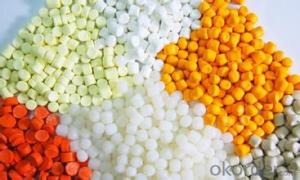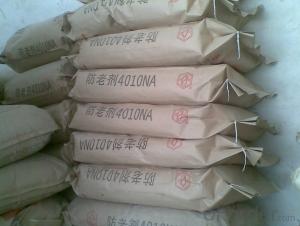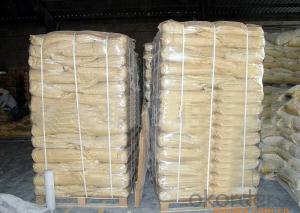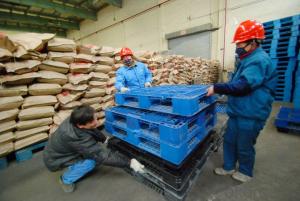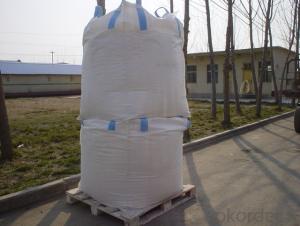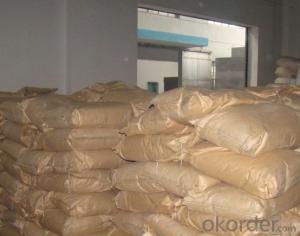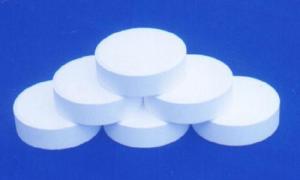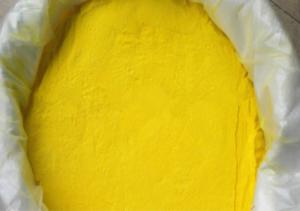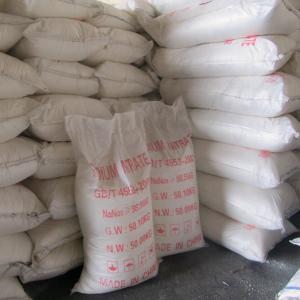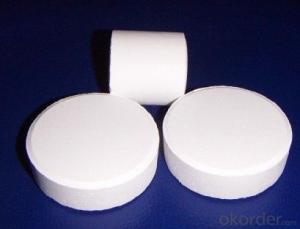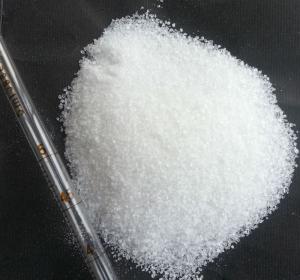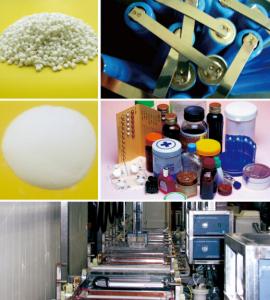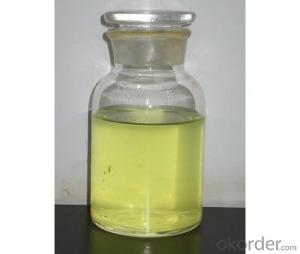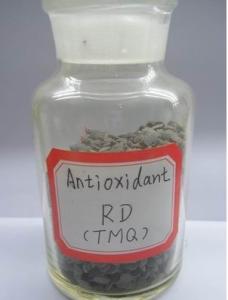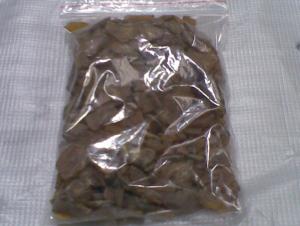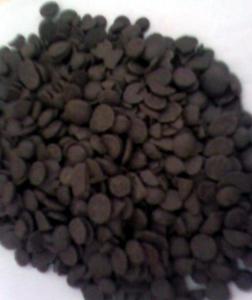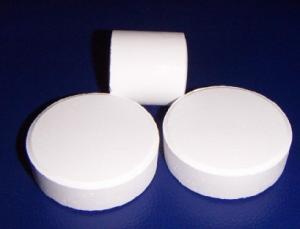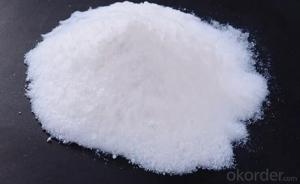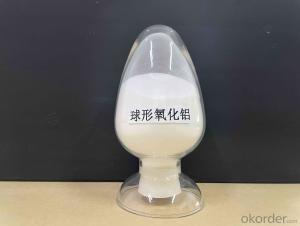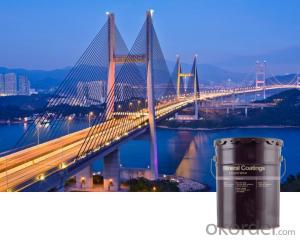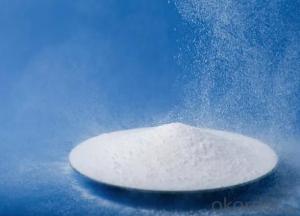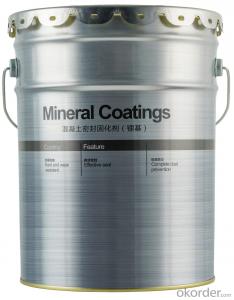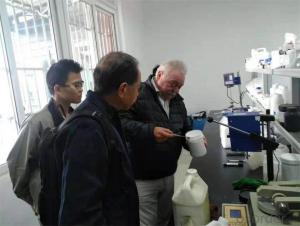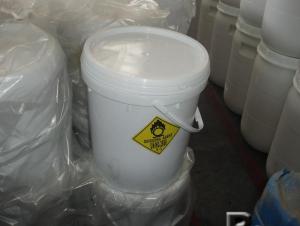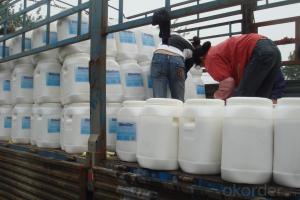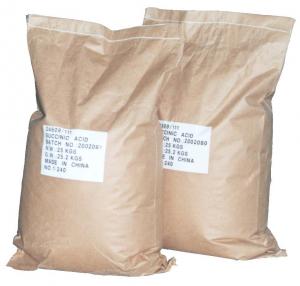RUBBER VULCANIZING ACCELERATOR CBS (CZ)
- Loading Port:
- Tianjin
- Payment Terms:
- TT OR LC
- Min Order Qty:
- 25 m.t.
- Supply Capability:
- 12000 m.t./month
OKorder Service Pledge
OKorder Financial Service
You Might Also Like
RUBBER VULCANIZING ACCELERATOR CBS(CZ)
Chemical Name: N-Cyclohexyl-2-benzothiazole sulfenamide
Molecular Formula: C13H16N2S2
Molecular Weight: 264.4
CAS NO. : 95-33-0
Executive standard:HG/T 2096-2006
Specification:
| Index | ||
High-class products | First-class products | Acceptable end-product | |
Appearance |
| ||
Initial M.P,oC ≥ | 99.0 | 98.0 | 97.0 |
Loss on drying,% ≤ | 0.20 | 0.30 | 0.50 |
Ash, % ≤ | 0.20 | 0.30 | 0.40 |
Residue,% ≤ | 0.00 | 0.05 | 0.10 |
In soluble in Methanol,% ≤ | 0.50 | 0.50 | 0.80 |
Purity,% ≥ | 97.0 | 96.0 | |
Free amine,% ≤ | 0.50 | ||
Properties: Gray, light yellow powder or granules with a little odor, no poison. The density is 1.31-1.34. And melting point 90-108 oC .Soluble benzene, methylene chloride, carbon tetrachloride, ethyl acetate, acetone, ethanol-soluble and petrol do not dissolve in water.
Application: to promote common aftereffect on sexual one. Furnace applicable to the use of black plastic material, both anti-burning performance and excellent short curing time two major advantages. Enable for natural rubber, recycled rubber, vinyl synthetic rubber, especially for the SBR. May be used alone, but also with promoting agent D, DT, TT, TS and others use. Because of a bitter, it can not be used for food-related products. Photochromic minor, do not emit cream vulcanizate excellent anti-aging properties. Used tires, shoes, hose and belt, cable, general industrial products.
Packaging: 25kg plastic woven bag, paper with plastic film bag, Kraft paper bag or jumbo bag.
Storage: The product should be stored in the dry and cooling place with good ventilation, avoiding exposure of the packaged product to direct sunlight. The validity is 1 year.
Note: The product could be ultra fine powder based on customer accurate requirement.
- Q:I think doubling the concentration of catalyst will double the rate of a reaction (K2/K1 =2). I want to confirm. This is for my project work. Please reply as soon as possible.
- A catalyst speeds up a chemical reaction by providing an alternate reaction pathway with a lower activation energy, thus increasing the number of collisions that can result in the formation of product. When the catalyst is a reactant in the rate determining step, and the reaction is first order in the catalyst, then a doubling of the concentration will double the rate. But if the rate determining step which includes the catalyst is not first order, then doubling the concentration won't double the rate. Then there is the case of a heterogeneous catalyst in which the reaction is essentially zero order in the catalyst. The amount of catalyst won't affect the speed of the reaction beyond the initial increase. The mere fact that the catalyst is present speeds up the reaction.
- Q:Always speeds the reation ratedoes not affect the reation rateundergoes a chemical changedoes not become part of the chemical changealways slows the reation rate
- The best answer is speeds the reaction rate. Generally it lowers the activation energy so that the reaction can proceed easier. Enzymes can be considered catalysts in the body that allow digestion to occur at a temperature like body temp, where it would go faster at a higher temp.
- Q:The catalyst can change the chemical reaction process, why is it wrong?
- The catalyst can change the chemical reaction rate
- Q:i know that the catalyst is not react in an reaction,,,so that i don't why could it speed up the reaction?? Further, how does the scientist determine the catalyst for certain reaction??please give me more example....i really want to know it! i do not have any idea about this...so hope your answer will help me....thanks!
- Normal reaction requires much heat and energy but a catalyst provides a space where it can be done without either since provides space for both to bump into each other and stay till they bond..so catalyst is not involved in reaction but allowed it to occur at a much lower temp and energy.
- Q:Can a catalyst decrease the rate of a chemical reaction? Please give an example if yes.
- no, by defintion the catalyst speeds up the reaction.
- Q:in my 99 ram 2500 v8 5.9 that code came up, not sure what to do about it or what it could be any ideas or help with be great thanks
- In after Robert M phaggotry. Oh, like that first poster said, be sure there aren't other faults causing the rear O2 sensor to pick up all that O2 in the exhaust...such as a rich-running engine.
- Q:A substance involved in chemical reflection, but reflects the quality of the material before and after the change, you say it is a catalyst?
- The role of the catalyst is to change the reaction rate of the chemical reaction, which itself does not participate in the reaction! The
- Q:What is the reaction in chemistry?
- Industrial production of ammonia, ethanol, industrial synthesis of ammonia, ethanol catalytic oxidation, acetaldehyde oxidation into acetic acid, ethyl acetate preparation, the transformation of automobile exhaust, benzene substitution reaction and addition reaction, some other addition reaction of hydrocarbons, Ethanol dehydration to produce ethylene and so on
- Q:The quality and nature of the catalyst before and after the chemical reaction did not change this sentence wrong? Why did the "middle school student study" say it was wrong?
- The newspaper is wrong and find the teacher's theory. The
- Q:Could you tell me all the differences between those two catalysts? Thank you very much.
- One occurs in biological systems and the other is in chemical reactions. Biological catalysts are basically enzymes - proteins which regulate biochemical reactions whilst chemical catalysts act on non-biological chemical reactions and are inorganic elements or compounds.
1. Manufacturer Overview |
|
|---|---|
| Location | |
| Year Established | |
| Annual Output Value | |
| Main Markets | |
| Company Certifications | |
2. Manufacturer Certificates |
|
|---|---|
| a) Certification Name | |
| Range | |
| Reference | |
| Validity Period | |
3. Manufacturer Capability |
|
|---|---|
| a)Trade Capacity | |
| Nearest Port | |
| Export Percentage | |
| No.of Employees in Trade Department | |
| Language Spoken: | |
| b)Factory Information | |
| Factory Size: | |
| No. of Production Lines | |
| Contract Manufacturing | |
| Product Price Range | |
Send your message to us
RUBBER VULCANIZING ACCELERATOR CBS (CZ)
- Loading Port:
- Tianjin
- Payment Terms:
- TT OR LC
- Min Order Qty:
- 25 m.t.
- Supply Capability:
- 12000 m.t./month
OKorder Service Pledge
OKorder Financial Service
Similar products
New products
Hot products
